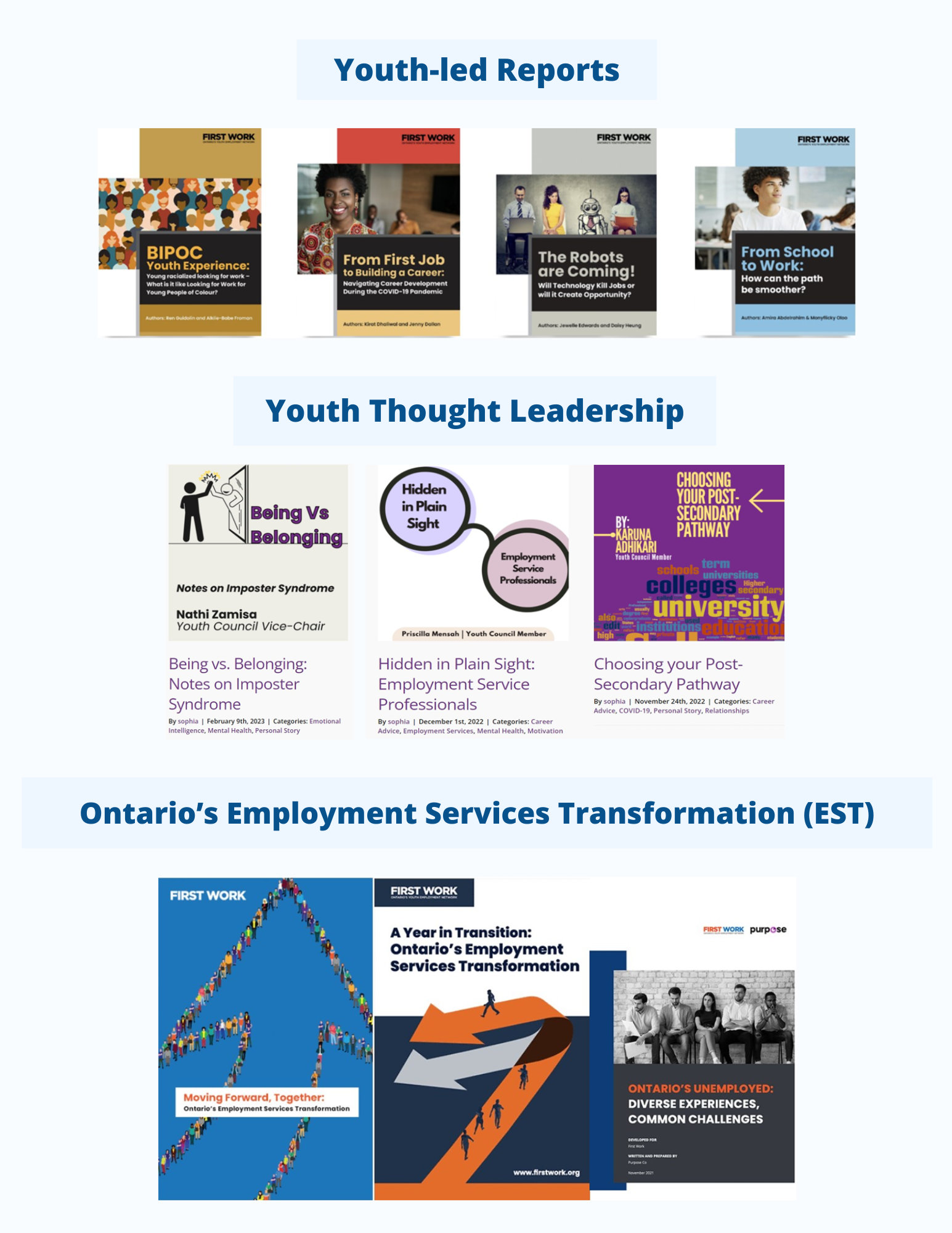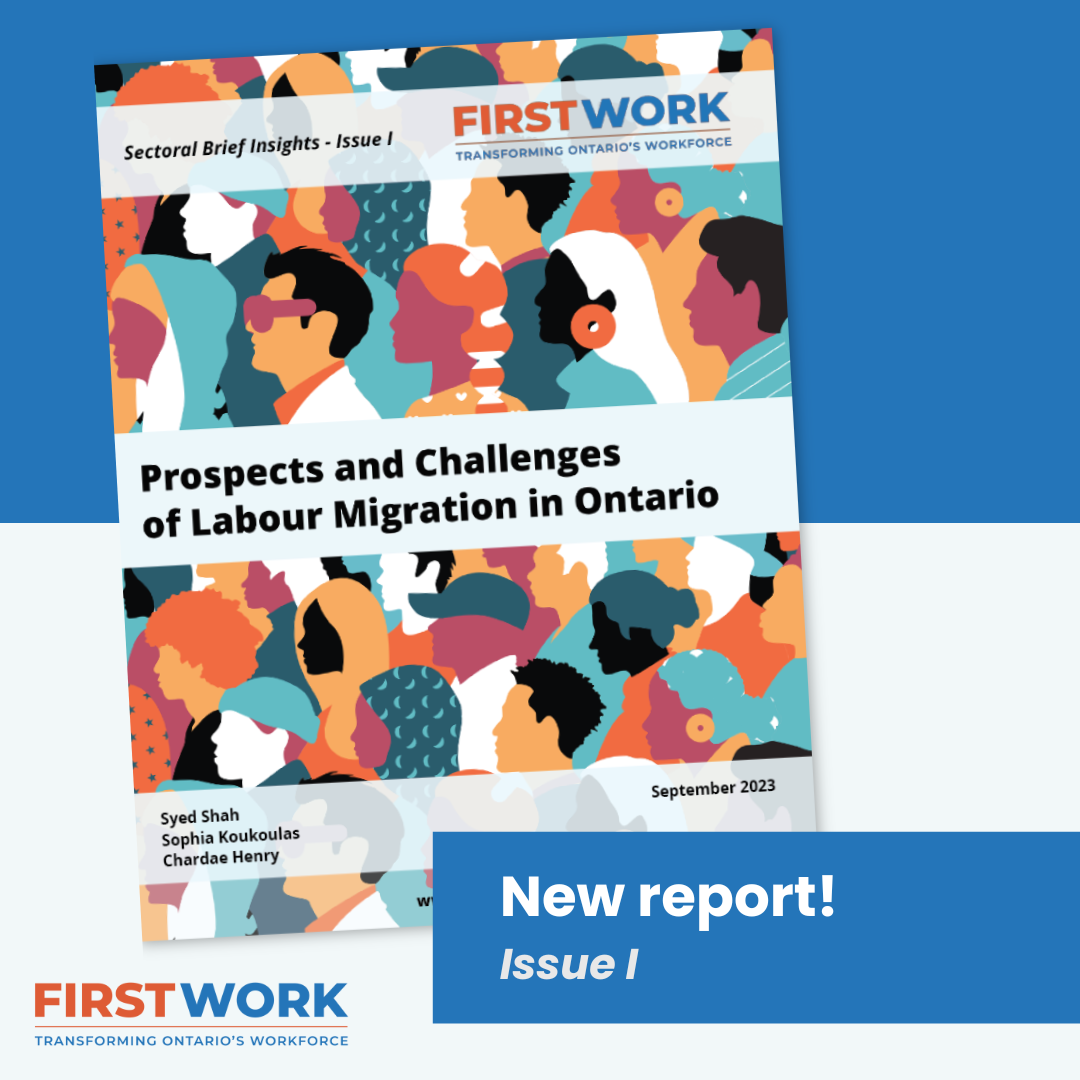First Work works collaboratively with our members, government, and workforce development partners to conduct research to push forward positive change.

Strategic Research Plan
Recognizing the need to advance our strategies through evidence-based research and policy, First Work has established our first strategic research plan. This plan represents the emphasis of First Work’s research efforts over the course of our current strategic plan and articulates priority research topics that will enable us to deliver on our mission. Our research priorities will be reviewed on a rolling basis and will be re-established upon development of the next strategic plan.
Ultimately, all First Work research efforts will be conducted with the aims of:
- Advancing our ability to advocate for the needs of the sector and jobseekers, especially youth and newcomers, across Ontario;
- Promoting engagement and continuous development of our member organizations; and
- Enabling sector excellence through innovative, evidence-based solutions and policies.
For further information on First Work’s current research initiatives, or to propose a collaboration, please contact [email protected].
Youth Outcomes Research Theme
Ontario’s employment service providers serve more than 70,000 youth per month with an overall placement rate of 71%. While much is known about the impact of employment service providers on an aggregate level, more research is needed to truly understand the long-term impacts of ESP services on youth career trajectories and on the economy at large. This research theme will emphasize initiatives that help us better understand the impact and effectiveness of the employment services sector and help make the case for the investment necessary to deliver on the needs of youth throughout the province.
Explore youth-led, youth-focused research via First Work’s Youth Council.
Sector Governance Research Theme
In 2020, Ontario’s employment services sector will undergo a significant transformation with the introduction of Service System Managers (SSMs). While there is a precedent for this model, including in British Columbia, the impact of this type of system transformation in Ontario is unknown. First Work, in partnership with experts in the field of public policy, will seek to understand the impact of Ontario’s system transformation, identify potential revisions to the SSM pilot framework, and encourage structural and systemic changes that positively influence jobseeker, especially youth and newcomers, employment outcomes.
Digital Integration Research Theme
Digitalization is fundamentally reshaping education, skills development and the path to employment. This creates both uncertainty and opportunity. As system navigators, employment service providers have an important role to play in helping jobseekers understand and access the wide variety of tools and technologies available. As part of this research theme, First Work will identify opportunities for technology integration and seek to understand the impact of digital employment tools on employment outcomes.
Employment Equity Research Theme
Youth face significant barriers to employment and, according to Statistics Canada, report the highest levels of unemployment of any age group. When age compounds with other factors such as minority, newcomer or low socio-economic status, employment disparities are exacerbated further. With the goal of improving employment outcomes for all jobseekers, First Work will investigate opportunities and approaches that target priority populations including First Nations, racialized, newcomer, and neurodiverse youth.
Ontario’s Employment
Services Transformation
Since 2019, Ontario has been undertaking a transformation to the employment supports offered through the Ministries of Labour, Immigration, Training and Skills Development (MLITSD), and Children, Community and Social Services (MCCSS).
Ontario’s EST is intended to better integrate the siloed-system of supports so that those facing barriers can successfully transition into meaningful employment by:
- Integrating all provincially distributed employment supports into one system overseen by MLITSD.
- Introducing revised service catchment areas and new oversight actor, Service System Managers (SSMs), in each catchment.
- Introducing performance-based funding to promote retention and accountability.
First Work began monitoring the Ontario employment services transformation (EST) in late 2020, with the aim to capture and understand the successes and challenges faced by the prototype regions. Through ongoing research and open dialogue during this transformation, First Work has generated insights on the experiences of employment service providers (ESPs), service system managers (SSMs), and job seekers from a secondary research, ESP and SSM perspectives.
Read First Work’s EST reports:
- The Weight of Paperwork: A time diary study on the impacts of the Employment Services Transformation in Ontario (July 2024)
- Making it Work: Delivering the Transformation Promise in Ontario (July 2024)
- Moving Forward, Together: Ontario’s Employment Services Transformation (May 2023)
- A Year in Transition: Ontario’s Employment Services Transformation (January 2022)
- Early Insights Report, Ontario’s Employment Services Transformation: A Good Vision (July 2022)
Sectoral Brief Insights
Series
First Work conducts research on emerging trends and challenges faced by Ontario’s workforce, published as Sectoral Brief Insights. These quarterly reports provide practical insights for employment service providers and sector partners.
Our goal with these reports is to help foster a workforce development ecosystem that ensures inclusivity for those further away from employment success.
Explore our
Previous Initiatives
As part of our mandate, First Work conducts project-based research on workforce development issues affecting the sector and young jobseekers. Through the input of our members, First Work has tackled various labour force issues either in partnership with like-minded organizations or through our internal capacity.
Ontario’s EST is intended to better integrate the siloed-system of supports so that those facing barriers can successfully transition into meaningful employment by:
Below is a sample of the latest findings from First Work’s research.

First Work’s Job Seeker Research: State of the Unemployed in Ontario
In early 2020, First Work undertook primary research with job seekers across the province for a report titled The State of the Unemployed in Ontario. This research documents the experiences and opinions of jobseekers to better identify gaps and barriers in the current supports system, while helping to inform the bridges needed to enhance employment success.
Senior-Youth Intergenerational Mentorship
With 4 generations now in the workplace, there is opportunity to support the development of age diversity in the workforce by championing intergenerational mentorships. Age diverse workplaces benefit from the wide range of experiences, beliefs, and motivations amongst the various generations, and the same benefits can be applied to intergenerational mentorships.
Find out more below on the benefits of intergenerational mentorship and recommendations on how to establish a program of your own.
DOWNLOAD: Exploring Opportunities for Senior-Youth Intergenerational Mentorship
New Horizons | Better Together Project
In 2019, First Work was selected to lead a research initiative known as Better Together. The aim of this research, funded by the New Horizons for Seniors Program, is to understand how seniors and youth can help one another thrive in the changing world of work.
In sectors such as retail, hospitality, tourism, manufacturing and more, seniors and youth increasingly occupy similar types of roles. However, significant generational differences can lead to tension and conflict – undermining workplace harmony and staff satisfaction. Despite this challenge, the opportunity for mutual support and learning is also significant. While youth are often valued for their energy, ingenuity, and adaptability, seniors are similarly valued for their wisdom, patience, and discipline. Together, seniors and youth have the potential to influence their workplaces in profound ways, and to support one another in living healthy, happy, and productive lives.
The purpose of this study is to understand the ways that mentorship programs can create reciprocal benefits for seniors and youth, and to identify best practices for structuring programs that allow seniors, youth, and the workplaces in which they operate, to flourish.
Project Integrate
In 2019, First Work – in partnership with Ontario Tourism Education Corporation (OTEC), MaRS Discovery District and the Canadian Council for Youth Prosperity – began working on an initiative funded by Canada’s Future Skills Centre. This initiative, called Project Integrate, aims to establish a blueprint for a seamless, tech-enabled and future-ready youth employment pathway.
As career paths have become less predictable, today’s youth face significant challenges making sense of the ever-changing world of work. A recent McKinsey report forecasted that by 2030, from 75 to 275 million workers will need to change careers. Artificial intelligence and big data are bringing disruption to the workforce, but they have also brought promising advancements in workforce innovation and HR technology. Sophisticated job matching, assessment and market analytics tools are increasingly accessible, but their adoption across the employment and training ecosystem remains inconsistent.
First Work was selected to conduct preliminary research and stakeholder engagement for the project. The aims of our research were to identify the various employment and training technologies being used across Canada, as well as to understand the enablers and barriers to the adoption of promising new technologies. Findings from our research have been summarized in a report entitled: Encouraging Adoption of Employment Tools & Technologies among Youth-Serving Employment Service Providers in Canada.

